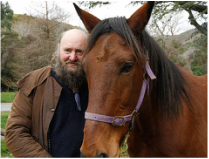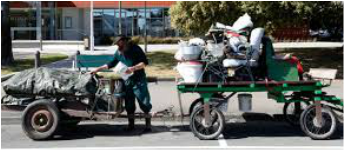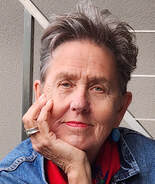
Clive now camps out on Nelson's main street (minus horse and cart) and has become the subject of renewed controversy during the lead up to the City Council elections. This republished profile is my contribution to the debate.

Hone Ma Heke aka Lewis Stanton has been a subject of much contention in Nelson for years. on a knoll by the skateboard rink in Neale Park while he told me his story, beginning with a “rough upbringing” in Blenheim. Until recently the dog and I have had only a nodding acquaintance with Hone Ma Heke. We would see him and his horse Barney during our walks through Guppy Park where he bivouacs beside a small, three-sided corrugated shed on the edge of the football field. I never stopped to talk – it didn't seem right to intrude into the fragile domestic privacy he establishes in such a public place.
However, when he wasn't there, I wondered where he was. During the winter especially, I wondered what it’s like to live in such a peripatetic life, being responsible for the welfare of an animal as large as a horse, carrying all one’s belongings on a cart, having no front door to retire behind.
Hone had already set up camp on the day I decided to make contact. He was stirring a pan of what looked like rice risotto on a small gas burner and Barney was placidly cropping the grass. I introduced myself and Hone put down his spoon to shake my hand. I explained that I was curious about more than the headlines and the angry sound-bites delivered from the court steps. I asked if we could talk sometime, and if I could write about it in this column.
So it was, that after Guy Fawkes, when there was no risk of the horse being panicked by fireworks, the dog and I spent a couple of hours with Hone on a knoll by the skateboard rink in Neale Park while he told me his story, beginning with a “rough upbringing” in Blenheim.
Hone wore a polka dot scarf around his neck and a battered hat with a blue SPCA sticker on the front. His forearms were tanned though his upper arms were still winter white. Hone said he got into trouble at school and ran away when he was 15. “I was no angel” he said, “and I’m still no angel”.
There’s a failed marriage in his past, a daughter lost in a custody battle and a conviction for a crime he says he was innocent of. That’s what seeded his contempt for the legal system and when he became really rebellious. “You have to play the cards you are dealt” Hone said, “but certain forces, they also step on you”.
There are well-worn grooves in Hone’s tale - his battle with the Council, injustice, the New Zealand Bill of Rights - but he’s also a good raconteur and comes up with some shrewd observations. He showed me the notebooks in which he records each day’s weather, donations and other notes like “Told to F**k Off”. There are receipts for horse feed gaffer-taped onto the pages.
I learn a few things: wet days mean fewer donations, and they’ll never make him rich; Barney used to be a racehorse; feeding him costs $61.50 a week; shoeing him costs a $1 for every a kilometre travelled; it takes Hone an hour to set up camp in the shed, two hours if he has to put up a tent; a ten minute car trip takes an hour with a horse and cart; he takes both carts with him everywhere because he’s afraid they’ll be vandalised.
Hone has been living rough for 25 years and he sets up camp with practised ease. As I watched, he took off Barney’s much-repaired harness and gave him a bucket of feed and a bucket of water from one of the big plastic water containers on the cart.
Then Hone hung up his hat on a nail and swept out the shed with a dust pan and brush, expressing surprise that it’s “not messier - there was a game at 1 o’clock”. He has a copy of the footy draw so he can make himself scarce when football games or practices are scheduled. On a ledge, he placed a rolled-up copy of the Nelson Mail, his glasses, a transistor radio, a torch and a toilet bag - mates let him use their shower and washing machine.
Everything has a place in the shed, and there’s a place for everything - the bag of chaff, a horse blanket, two chilly bins, a gas stove, two Thermos flasks and a Thermos cup, frying pans, utensils, a bottle of cooking oil, dish-washing gear and a folding chair. Stuff he won’t need tonight, like the tent, the electric fence, the solar panel and the 12 volt deep cycle battery stay on the cart.
As the dog and I made my farewells Hone was hooking up a tarpaulin to create a fourth wall for the shed and about to make up his bed.
Later that evening, I couldn't help but think of Hone in his makeshift shelter, and Barney standing out there in the dark only a few hundred metres away from where I was tucked up comfortably in bed with an electric light to read by, a heat pump, running water, a toilet, a stove and a refrigerator full of food.
I don’t really know Hone Ma Heke. Probably few people do. It’s possible that he is the criminal, the madman, the lazy bastard or the charlatan that his critics say he is.
But he is also a man who chooses to live a hard and precarious life which few of us could endure and which brings with it public scorn and vituperation and the risk of imprisonment.
And he does it for a sincerely-held principle.
 RSS Feed
RSS Feed

